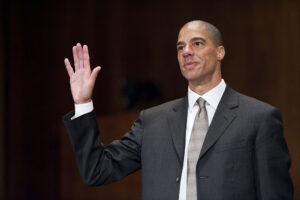Former Federal Judge Explains Why Supreme Court's Decisions In Dobbs, Bruen Led To Him Stepping Down
Members of the legal community have long wondered why Paul Watford quit the bench at such a young age. Now we know that the Supreme Court played a role in his decision.

(Photo by Bill Clark/Getty Images)
Ed. note: Welcome to our daily feature, Quote of the Day.
Part of it had to do with the Supreme Court’s direction. I don’t think it’s any surprise my views as a judge weren’t in sync with the Supreme Court majority. When Dobbs and Bruen came down, I had cases on my docket involving abortion and gun rights. It was apparent those cases would be affected by what the Supreme Court just decided. The realization sunk in that probably for the rest of my time on the bench, that I would see cases where my own views as to how those cases should be resolved would be at odds with the way the Supreme Court thinks they should be resolved and it nonetheless would be my duty to apply those decisions faithfully.
That caused me to think, ‘Is this what I want to do for the rest of my legal career?’ I was disheartened when Bruen and Dobbs were decided…. I struggled with ‘What does this mean in terms of where the Supreme Court is headed?’ But I can’t say I gave much thought at that point to stepping down.
— Wilson Sonsini partner Paul Watford, formerly of the Ninth Circuit, in comments given to the National Law Journal on what led to his decision to resign from a federal appellate court to return to private practice. Watford continued, saying he gave more thought to stepping down after receiving a call from Judge Gary Feinerman, who also decided to leave the bench. “[Hearing] the concerns that led him to make that decision and the questions he asked himself, I started asking myself the same questions,” he said. “I realized I can do something different, and something I’ll enjoy more than remaining on the bench. That’s not to take away from the 11 years I served. I view it as the highest form of public service that a lawyer can engage in – to apply the law and have the public respect that you’re an impartial decision maker.”
 Staci Zaretsky is a senior editor at Above the Law, where she’s worked since 2011. She’d love to hear from you, so please feel free to email her with any tips, questions, comments, or critiques. You can follow her on Twitter and Threads or connect with her on LinkedIn.
Staci Zaretsky is a senior editor at Above the Law, where she’s worked since 2011. She’d love to hear from you, so please feel free to email her with any tips, questions, comments, or critiques. You can follow her on Twitter and Threads or connect with her on LinkedIn.







